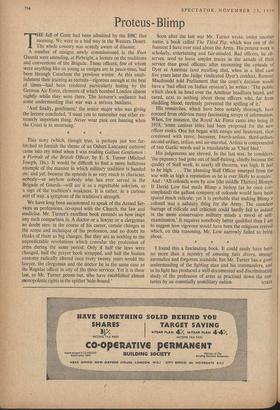Proteus - Blimp
THE fall of Crete had been admitted by the BBC that morning. We were in a bad way in the Western Desert. The whole country was acutely aware of disaster. A number of ensigns newly commissioned in the Foot Guards were attending, at Pirbright, a lecture on the traditions and conventions of the Brigade. These officers, few of whom were anything like as young as ensigns are in peace-time, had been through Caterham the previous winter. At this estab- lishment their training as recruits—rigorous enough at the best of times—had been rendered particularly testing by the German Air Force, elements of which bombed London almost nightly while they were there. The lecturer's audience had some understanding that war was a serious business.
`And finally, gentlemen,' the senior major who was giving the lecture concluded, 'I want you to remember one other ex- tremely important thing. Never wear pink out hunting when the Court is in mourning.'
* * * This story (which, though true, is perhaps just too far- fetched to furnish the theme of an Osbert .Lancaster cartoon) came into my mind when I was reading Gallant Gentlemen : a Portrait of the British Officer, by E. S. Turner (Michael Joseph, 18s.). It would be difficult to find a more ludicrous example of the manner in which military tradition is handed on; and yet, because the episode is so very much in character, nobody—or anyhow nobody who has ever served, in the Brigade of Guards—will see it as a regrettable solecism, as a sign of the tradition's weakness. It is rather, in a curious sort of way, a symptom of the tradition's strength.
We have long been accustomed to speak of the Armed Ser- vices as professions, co-equal with the Church, the law and medicine. Mr. Turner's excellent book reminds us how inapt any such comparison is. A doctor or a lawyer or a clergyman no doubt sees, in the course of his career, certain changes in the scope and technique of his profession, and no doubt he thinks of them as big changes. But they are as nothing to the unpredictable revolutions which convulse the profession of arms during the same period. Only if half the laws were changed, half the prayer book scrapped, and half the human anatomy radically altered once every twenty years would the lawyer, the clergyman and the doctor be in the same case as the Regular officir in any of the three services. Yet it is these last, as Mr. Turner points out, who have established almost monopolistic rights in the epithet 'hide-bound.' Soon after the last war Mr. Turner wrote, under another name, a boa called The Third Pip, which was one of the funniest I have ever read about the Army. His present work is scholarly, entertaining and fair-minded. Bad officers, he ob- serves, tend to leave ampler traces in the annals of their service than good officers; after recounting the episode Of Dyer at Amritsar (and recalling that, when in a libel case five years later the Judge vindicated Dyer's conduct, Ramsay Macdonald told Parliament that the court's decision would have a 'bad effect on Indian opinion'), he writes : 'The public which shook its head over the Amritsar headlines heard, and cared, next to nothing about those officers who, far from shedding blood, tirelessly prevented the spilling of it.'
His researches, which have been notably thorough, have rescued from oblivion many fascinating scraps of information. When, for instance, the Royal Air Force came into being in 1918, 'some curious titles had been proposed for the new officer ranks. One list began with ensign and lieutenant, then continued with reeve, banneret, fourth-ardian, third-ardian, second-ardian, ardian. and air-marshal. Ardian is compounded of two Gaelic words and is translatable as 'Chief bird.'
His judgements are shrewd. In the last war, he considers, 'the piquancy had gone out of Staff-baiting, chiefly because the quality of Staff work, in nearly all theatres, was high. It had to be high. . . . The planning Staff Officer emerged from the war with as high a reputation as he is ever likely to acquire. And : 'All colonels were by now [the middle Thirties] Blimps. If David Low had made Blimp a bishop (as he once con- templated) the gallant company of colonels would have been spared much ridicule; yet it is probable that making Blimp a colonel was a salutary thing for the Army. The ceaseless barrage of ridicule and criticism could hardly fail to induce in the more conservative military minds a mood of self- examination?, It requires somebody better qualified than I am to suggest how vigorous would have been the religious revival which, on this reasoning, Mr. Low narrowly failed to bring about.
* * *
I found this a fascinating book. It could easily have been no more than a tapestry of amusing faits divers, strange anomalies and forgotten scandals; but Mr. Turner has a good understanding of the fighting man and his commanders, and in its light has produced a well-documented and discriminating study of the profession of arms as practised down the cen- turies by an essentially unmilitary nation. sraiX










































































 Previous page
Previous page